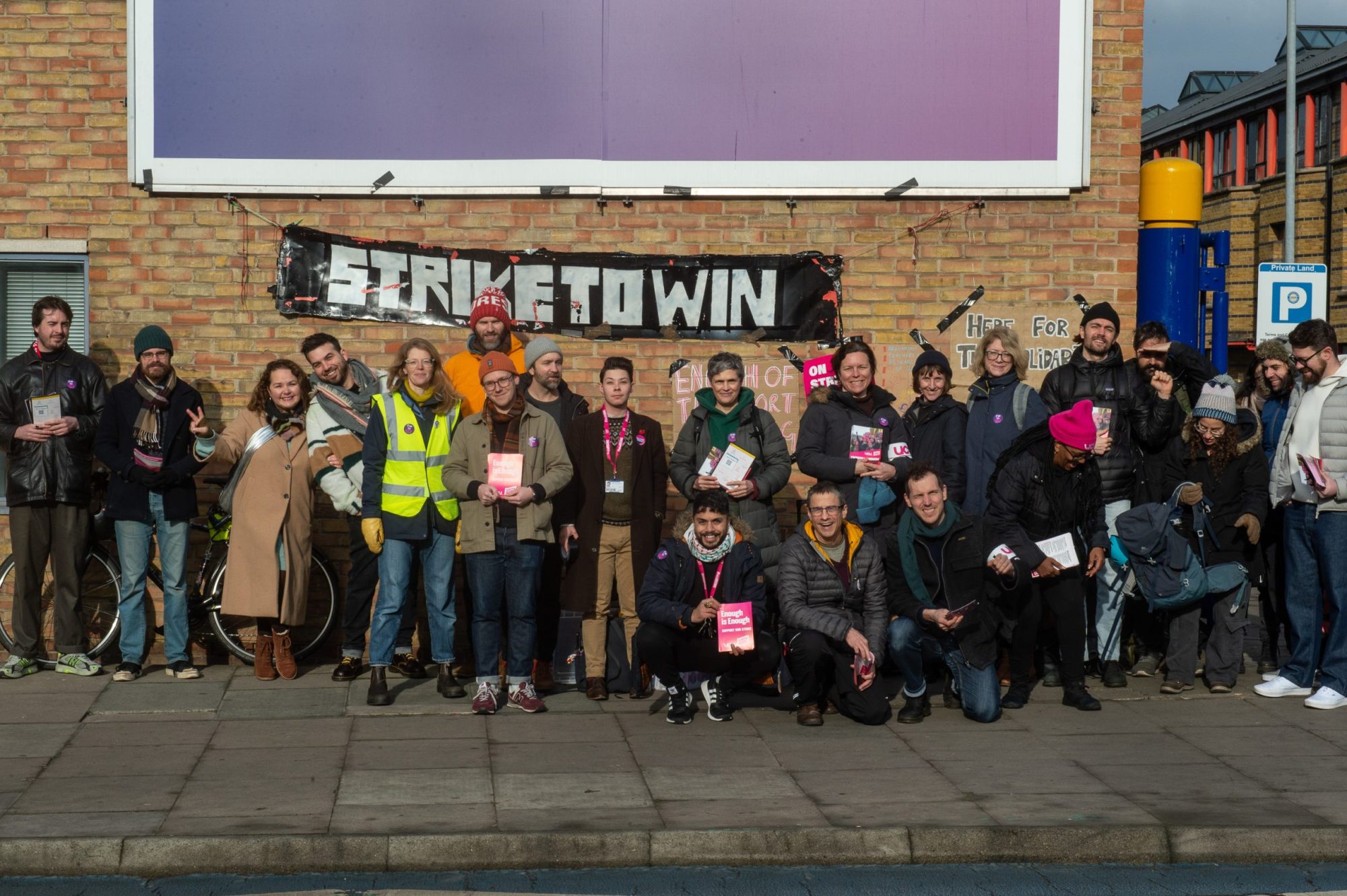The United Kingdom is undergoing a massive wave of industrial action this winter as the cost of living crisis bites. Most recently it’s been the university higher education professionals who have been on strike. The Real News Network spent time at picket lines across London as the University College Union, or UCU walked out from their work in a dispute over pay and pension cuts. The UCU has thousands of members across the UK and hundreds of colleges and universities have picket lines. The strikes, which are happening amongst dozens of other labor disputes are the biggest in the UK since the Thatcher years. This video is part of a special Workers of the World series on the cost of living crisis in Europe.
Producer, videographer, and video editor: Ross Domoney
This story, with the support of the Bertha Foundation, is part of The Real News Network’s Workers of the World series, telling the stories of workers around the globe building collective power and redefining the future of work on their own terms.
Transcript
Protester: “Union – power!”
Narration: Across the UK, the University and College union, or UCU, is on strike. Multiple university and college campuses have picket lines and tens of thousands of the UCU members have walked out from their work.
Protester: There is a sense in the country of things having been pushed past the brink.
Narration: The UCU is made up of higher education professionals, which includes lecturers, academics, researchers, librarians, and postgraduates in universities and colleges.
Protester: Do we want a 5% pay cut this year? No. When they offer a 5 pay rise, what do they really mean? A 5% pay cut with 10% inflation. So that’s no good.
Narration: The Real News Network spoke to UCU members at picket lines across London.
Ewan Mcgaughey (Reader in Law at King’s College London): We’ve had 25% real-terms pay cuts since 2010 when this Tory government took power. We’ve had pension pay cuts of 30%, often more for younger staff.
Protester: “Wages!”
“Rising!”
“Wages!”
“Rising!”
“Pensions?”
“Rising!”
They are actually dropping.
We want them to be rising!
Ewan Mcgaughey (Reader in Law at King’s College London): In 2010, home students paid about £3,000 per year to go and study and since then it’s tripled for home student fees, and yet investment in teaching, you know, teachers’ pay, has been going down.
For international students it’s more than doubled. So international students will be paying about £25,000 for an undergraduate degree. It’s absolutely extortionate.
Protester: We’re going to be talking about protest music this morning.
Shakuntala Banaji (Professor of media culture at LSE): Well, I’ve been seeing over the last ten years, but even more than that, probably, a real-time cut in people’s pay and that might sound like an academic statistic to some people, but what it means for many of my colleagues is that they are not able to live in London. They have commutes of over 2 hours.
Many of my students have to make decisions about whether they eat lunch or dinner, and they also have other things competing for their time with trying to do their master’s or doctorate degrees, which means that because the pay for graduate teachers is so low they are working two or three jobs now just to try to stay afloat.
Dan Brown (PhD student): Everything’s being cut in the name of profit, like in the name of the university making a lot of money but cutting basic services for students, like mental health. They have a lot of money to build these buildings, but they don’t, they don’t want to invest that money In to properly paying staff and having enough staff in, I don’t know, even some basic services for students.
So it’s really just trashing the whole ability to produce a good education, right?
Shakuntala Banaji (Professor of media culture at LSE): So I’ve seen a massive deterioration in the mental health of my colleagues and students over the last ten years and that’s just one of the reasons that I’m on strike today.
Another one is clearly the massive gaps between particular types of workers in the university and many students and many members of the public probably don’t even know that people are being taught by someone who’s getting paid something close to £10 an hour. Even though they’re told they’re getting £25 an hour, it works out with preparation and marking that they’re getting under a minimum wage at some points.
Protester: “Solidarity forever for the union makes us strong”
Ewan Mcgaughey (Reader in Law at King’s College London): Well, yeah, I mean, workloads have been going up, particularly since COVID, so the numbers of students were raised quite a lot through the pandemic. Universities thought that they were going to have cash flow problems so they increased the number of people who came into universities but they didn’t have a corresponding increase in the number of staff, so that means that people are teaching more students in classes -not in itself a bad thing- but when you’ve got the same number of colleagues, it’s going to mean extra essays to mark, it’s going to mean extra exams, extra pastoral care and time that you’ve got to spend with more students.
So I want to see everybody going to university as much as possible.
Everyone who wants to should be able to have a good higher education free at the point of use, but we need to fund it properly. We need to make sure that the jobs are there too; make sure that everybody gets an education without burning everyone out.
Protester: “What do we want?”
“Fair pay!”
“When do we want it?”
“Now!”
“What do we want?”
“Fair pay!”
“When do we want it?”
“Now!”
Devika Dutt (Lecturer in Development Economics): There’s so many- I know the statistic- that there’s a lot of people who are seeking, amongst faculty, who are seeking mental health services because they’re so burnt out, because they’re so over worked.
Now, that is really an unsustainable and inhuman condition to really be working in. And, you know, what we’re trying to do is teach students, is create knowledge, and it’s very hard to do that in these conditions.
In general, as we know, there’s a cost of living crisis we are in and people are struggling to make ends meet. That includes university lecturers, and it’s more acute for people who are not white, people who are not men, and people who have disabilities.
And so, knowing all of that, and knowing that we have a huge workload, I really want to do my job well but unfortunately our workloads don’t allow many of us, including me, to devote the time that we would like to to do our job really well, to teach students really well, do our research really well.
Narration: Amongst dozens of other labour struggles happening in the UK right now this is the latest one to test the government.
In a country that is suffering from inflation and the realities of Brexit things are not looking so great in Great Britain.
Shakuntala Banaji (Professor of media culture at LSE): I think if we do get our demands met, it’s absolutely not enough to say for people to say, okay, I’ve got a wage rise, we’ve got more security in our sector- we need to just go back to being complacent.
What got us into this in the first place was ignoring the matters of other people’s rights.
So I think if we don’t do a lot more than just struggling for wage justice, if we don’t think about the human rights of people who are dying crossing the channel people who are suffering now because of the earthquake in Turkey and Syria, I think we are going to end up being a very insular, very fragmented and completely undemocratic nation.
Help us improve our international labor coverage by taking this quick survey
It should only take two minutes, and all answers are confidential.



